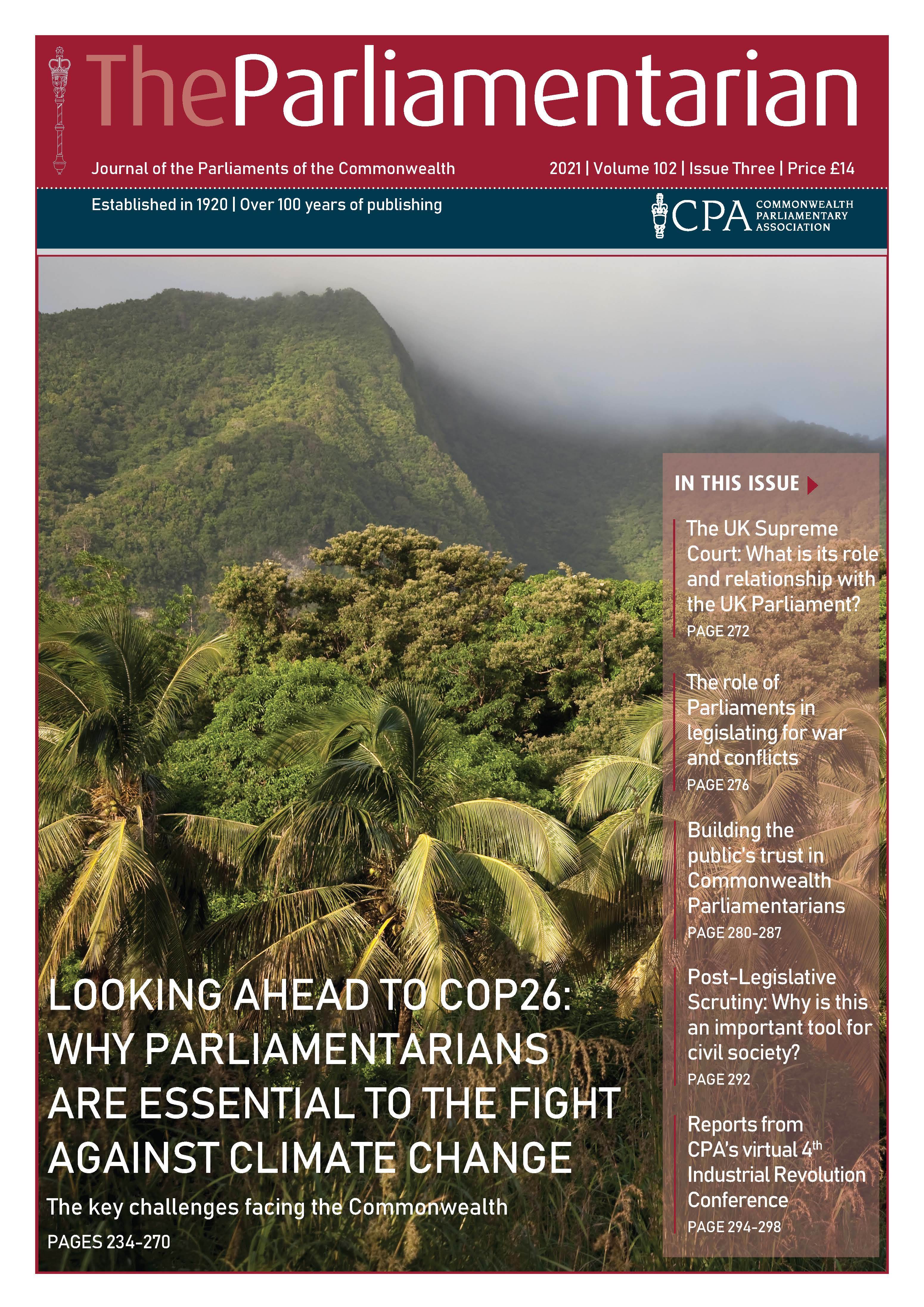The Parliamentarian is the quarterly Journal of Commonwealth Parliaments published by the Commonwealth Parliamentary Association (CPA) and features articles, news and legislative reports written by Members of Parliament, parliamentary staff and international experts across the Commonwealth about a wide range of global issues. Click here to download the latest issue.

How Guernsey's role in green finance could bring investment to small states in the Commonwealth
This blog is part of the CPA’s blog series, ‘Climate change challenges for the Commonwealth'. The series was published as the COP26 conference takes place in Glasgow in November 2021. You can find all the articles in the series here.
The scale of investment required to fight climate change is in the trillions, and global policymakers are being pushed to use green finance as the weapon as explained by Guernsey's Deputy Lyndon Trott.
Guernsey does not often get the chance to operate on a truly global stage. Although over the course of history, our people have made a huge impact in establishing international trade links, in the arts, and in sport, it is rare that Guernsey, as a small jurisdiction, has a chance to position itself globally.
Green finance is such a chance, a huge global movement. The scale of investment required to fight climate change is in the trillions, and global policymakers are being pushed to use finance as the weapon.
Investment in this space is needed because people are realising that, as Ban Ki-moon, the former United Nations’ Secretary-General, said: ‘There is no plan B, because there is no planet B’.
Given our specialism in finance, Guernsey has an ability to play an outsize role in this global cause where financial services drives more than 40% of our GDP and more than 70% of our export economy – and indeed our place in the world. Green finance is a global cause, and a fast-moving cause.
Guernsey’s green finance strategy, developed with the full support and participation of the States of Guernsey, is today the keystone of our island’s financial services strategy, the golden thread which runs through our business. The Intergovernmental Panel on Climate Change (IPCC) has also consistently reported that there is ‘no time to lose’.
The climate crisis has arrived, and is accelerating faster than most expected, threatening natural ecosystems and the fate of humanity. We face the risk of potentially irreversible climate tipping points, and chain reactions disrupting ecosystems, society and economies. Transformative change on the scale required will cost a lot of money – out of the scope of small governments such as Guernsey, and also too challenging for the major global economies.
Governments alone will not be able to finance this transition. So the green finance sector – and investment from institutions and individuals – will play a key part. Guernsey’s government has played its part so far, meeting emissions targets, embedding environmental sustainability into our formal investment frameworks, including our investment principles for the States of Guernsey and our regulatory framework, and providing funding to develop the green finance initiative.
But while we do what we can at a local level to fund the necessary transition, we are a community of 65,000 people and this is a global problem that requires a global joined-up solution. Technology projects and infrastructure that our local finance sector funds in other parts of the world are much more likely to be on a scale that will have a bigger global impact compared to what the sector invests in locally.
Last summer, Guernsey Finance, the promotional agency for our island’s financial services industry, organised a week-long event, Sustainable Finance Week, which should have actually taken place in Guernsey. COVID-19 put paid to that, but we continued with the event, over the course of three webinars and three podcasts, with international guests and reach to a global audience.
It has certainly been our aim to be recognised as a significant contributor to the green finance debate. Guernsey Finance’s membership of the United Nations’ Financial Centres for Sustainability (FC4S) network – alongside global finance centres including London, Luxembourg, Paris, Shanghai and New York – is now well-established. We have a longstanding relationship with the UK’s Green Finance Institute. Our schedule of green finance events continues to position ourselves strongly on a local, national and international platform.
Many of those who already have a record of involvement in sustainable finance, and others who will now enter the frame, instinctively believe that they would have most effect via supporting impact investment, rather than another round of involvement with enhanced ESG (Environmental, Social and Governance), which in many senses is required, but has become something of an industry in itself. There are differences in sentiment as to whether individuals and institutions should make direct investments in this space or operate on a co-investment basis or through specialist funds. Scale and skill sets vary considerably here, and that will have a major influence on strategies.
There is a danger that the ‘ESG conversation’ post-COVID-19 is swamping the green and sustainable finance space. Conformance with ESG is one thing, but the conversations are rarely grounded by the actuality of the current provision and data.
In Guernsey, we accept that simple metrics and reporting are necessary. We are seeing the emergence of ESG reporting as a portfolio function for administrators here in Guernsey, given the island’s leadership in the development of sustainable finance product and services. We must guard against costly complexity. For finance, there is a simple measure – carbon content of the portfolio, and its path to zero.
Investors’ need for a trusted, transparent product was the rationale behind our creation of the Guernsey Green Fund, the world’s first regulatory regime, in 2018. A simple, straightforward notification and disclosure regime, aligned with international standards, designed to provide investors with confidence from a regulatory wrapper. In a similar vein, our Green Principles for Private Equity, described at the time by market commentators as simple ESG principles, provided a straightforward guide to investing, aligned with the climate change agenda.
The private equity industry and private markets need the comfort and confidence of a robust investment product, aligned with global standards, without the cost and complication of prescriptive rules. There is plenty that we can still do. There is plenty that the world, and the global financial services industry, needs to do to finance climate change mitigation.
These are immensely important subjects where there is a leadership void at present. 2021 is the year of COP26 in Glasgow and we hope to be part of the global conversation. Guernsey has the will to stay at the forefront of this global issue. Our global futures depend on it.
This blog post is an extract from a longer article in The Parliamentarian (2021 Issue One) - to read the full article please click here.
This blog is part of the CPA’s blog series, ‘Climate change challenges for the Commonwealth'. The series was published as the COP26 conference takes place in Glasgow in November 2021. You can find all the articles in the series here.




